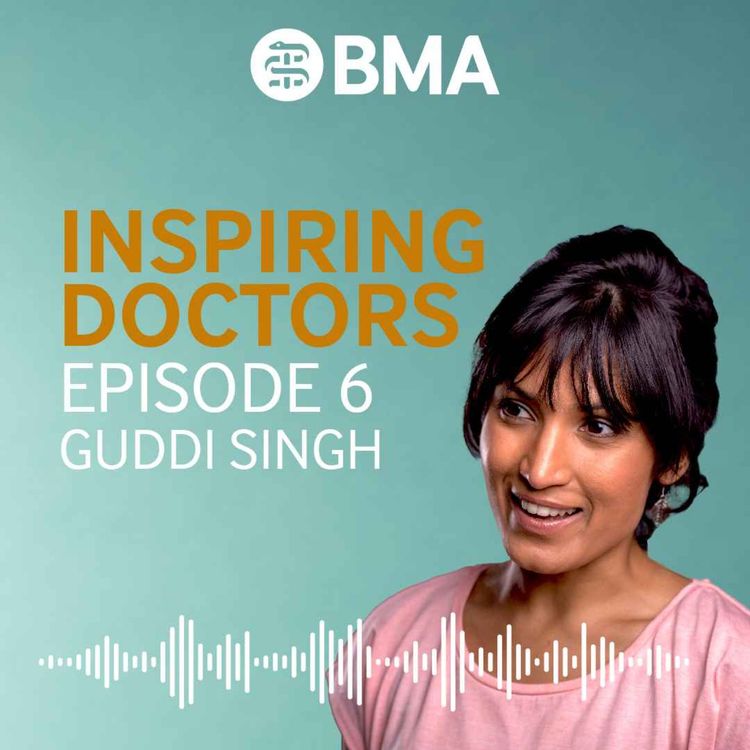Share

Inspiring Doctors
Guddi Singh
In this episode, Martin talks to Guddi Singh – a paediatrician who co-hosted the television series Your Body Uncovered and Babies, Their Wonderful World, and is an advocate for creative health and health justice. They discuss doctor burnout, introducing dance to the paediatric ward, addressing health inequalities, the importance of Quality Improvement skills, and educating the public through TV.
Episode transcript available at bma.org.uk/inspiringdoctors
You can find out more about the Wellbeing and Health Action Movement (WHAM) at www.whamproject.co.uk/ and the National Centre for Creative Health at https://ncch.org.uk/
The interviewees on this podcast are just a selection of those who communicate medicine in fantastic ways. To join the conversation on social media and tell us about doctors whose communication skills inspired you, tag @TheBMA on Twitter and Instagram, and use #InspiringDoctors. For more information visit: bma.org.uk/inspiringdoctors
More episodes
View all episodes

17. The Doctor Podcast | Trailer
01:18||Season 1, Ep. 17Good news, listeners. The BMA has launched a new podcast. In The Doctor Podcast, you will hear the voices of doctors, for doctors, brought to you by the British Medical Association. Each month, we delve into a story from The Doctor magazine’s award-winning journalism. We bring you voices from the medical profession and discuss the issues that matter to doctors and medical students. You can find The Doctor on Apple podcasts, Spotify, or wherever you get your podcasts. Just search ‘The Doctor BMA’ to find us. The British Medical Association is a professional association and trade union for doctors and medical students in the UK. For more information on the BMA, our services and how we can help you as a doctor, please visit www.bma.org.uk
16. Bonus: Wise words
53:16||Ep. 16In each of the past 15 episodes, Prof. Martin McKee spoke with people he sees as role models for communicating medicine to a wider audience. He asked them about what inspired them, the lessons they have learned, and their advice for doctors who may want to follow in their footsteps. In this bonus episode, we summarise their wise words and Martin shares his own advice to young doctors who may want to follow in his footsteps. You do not need to have listened to any of the episodes to enjoy this one, but we hope that if you haven't, this might pique your interest in listening to the series. Episode transcript available at bma.org.uk/inspiringdoctors The interviewees on this podcast are just a selection of those who communicate medicine in fantastic ways. To join the conversation on social media and tell us about doctors whose communication skills inspired you, tag @TheBMA on Twitter and Instagram, and use #InspiringDoctors. For more information visit: bma.org.uk/inspiringdoctors
15. Stephen McGann and Heidi Thomas
01:23:11||Ep. 15In our final episode, Martin speaks to two special guests, from the team behind the BBC series ‘Call the Midwife’. Stephen McGann, who plays Dr Turner, and is not only an actor but also an experienced science communicator; and Heidi Thomas, an accomplished screenwriter and playwright who is the creator, writer, and executive producer of the series. They talk about the opportunities of the show to deliver health messages to its wide audience, the response doctors have had to fictional GP Dr Patrick Turner, Heidi’s childhood aspirations towards healthcare, Stephen’s science communication work, and much more. Episode transcript available at bma.org.uk/inspiringdoctors Content warning: this episode contains some discussion about the history of abortion rights and the thalidomide scandal. You can avoid those by skipping from 52:15 to 59:00 for thalidomide, and 59:00 to 1:07:41 for abortion.The episode also contains a few very mild spoilers for Call the Midwife. You can watch Call the Midwife on the BBC iPlayer for listeners in the UK. For our US listeners, you can find it on PBS, and our Australian listeners can find it on ABC iview.To find out about the Science Communication Unit at Imperial College London, visit imperial.ac.uk/science-communication-unit/ The interviewees on this podcast are just a selection of those who communicate medicine in fantastic ways. To join the conversation on social media and tell us about doctors whose communication skills inspired you, tag @TheBMA on Twitter and Instagram, and use #InspiringDoctors. For more information visit: bma.org.uk/inspiringdoctors
14. Ian Fussell
35:33||Ep. 14In this episode, Martin speaks to Ian Fussell, a Professor and Associate Pro Vice Chancellor at the University of Exeter – and once GP partner. He talks to Martin about combining science with poetry and storytelling at the COP26 and COP27 climate change conferences, making a music album about the climate crisis, using humanities in undergraduate medical education, and the importance of trust. Episode transcript available at bma.org.uk/inspiringdoctors You can find information on Exeter as a City of Literature at www.exetercityofliterature.com/The One Chance Left album can be found on Spotify at https://spoti.fi/3PlIBR9 The two poems mentioned are Forgetfulness, by Billy Collins, available at: poetryfoundation.org/poetrymagazine/poems/37695/forgetfulnessAnd In The Theatre, by Dannie Abse, available at: poetryfoundation.org/poems/48469/in-the-theatre ; with a reading by the author at: poetrystation.org.uk/poems/in-the-theatre The interviewees on this podcast are just a selection of those who communicate medicine in fantastic ways. To join the conversation on social media and tell us about doctors whose communication skills inspired you, tag @TheBMA on Twitter and Instagram, and use #InspiringDoctors. For more information visit: bma.org.uk/inspiringdoctors
13. Hannah Barham-Brown
58:18||Ep. 13In this episode, Martin speaks to Hannah Barham-Brown, a GP trainee who is an activist, campaigner and advocate around gender, disability and LGBTQ+ issues, a former Deputy Leader of the Women’s Equality Party, and one of the Shaw Trust’s 100 most influential disabled people in the UK. She speaks to Martin about the role of doctors in politics, being a ‘roll model’, how to have awkward conversations, and why everyone should pay attention to the bins in NHS bathrooms.Episode transcript available at bma.org.uk/inspiringdoctorsContent warning: use of a disability-related slur in the context of a discussion on appropriate language. To avoid it skip from 43’09 to 43’47.The organisations mentioned as resources for doctors learning about disability and LGBTQ+ health inequalities are Scope, Leonard Cheshire, GLADD (The Association of LGBTQ+ Doctors and Dentists), the LGBT Foundation, and the RCGP's LGBT Health Hub.You can also find a list of EDI book recommendations on Hannah's website hannahbarhambrown.com/The interviewees on this podcast are just a selection of those who communicate medicine in fantastic ways. To join the conversation on social media and tell us about doctors whose communication skills inspired you, tag @TheBMA on Twitter and Instagram, and use #InspiringDoctors. For more information visit: bma.org.uk/inspiringdoctors
12. Nick Black
51:46||Ep. 12In this episode, Martin speaks to Nick Black, a health services researcher, professor and author, whose interest in history led him to write a guidebook entitled Walking London’s Medical History, and more recently his first historical fiction novel, The Honourable Doctor. They discuss Nick’s lifelong desire to educate the public, the disciplines that can enhance health systems improvement, the difference between whistle-blowers and reformers, and the parallels between the Covid pandemic and a shortage of French leeches in the Napoleonic era.Episode transcript available at bma.org.uk/inspiringdoctorsYou can find Nick's books at https://nickblackauthor.com/The interviewees on this podcast are just a selection of those who communicate medicine in fantastic ways. To join the conversation on social media and tell us about doctors whose communication skills inspired you, tag @TheBMA on Twitter and Instagram, and use #InspiringDoctors. For more information visit: bma.org.uk/inspiringdoctors
11. Alice Roberts
01:01:35||Ep. 11In this episode, Martin speaks to Alice Roberts, an anatomist, paleopathologist and science communicator who is best known for bridging the gap between medicine and archaeology. Her rich broadcasting career started on Time Team, and she tells Martin about this and much more, including public engagement in science, the important links between medicine and evolution, and the challenges of talking about reproductive systems on the BBC before 9pm.Episode transcript available at bma.org.uk/inspiringdoctorsYou can find Alice's work including her newly published children's novel Wolf Road at www.alice-roberts.co.uk/ The interviewees on this podcast are just a selection of those who communicate medicine in fantastic ways. To join the conversation on social media and tell us about doctors whose communication skills inspired you, tag @TheBMA on Twitter and Instagram, and use #InspiringDoctors. For more information visit: bma.org.uk/inspiringdoctors
10. Dominic Pimenta
47:57||Ep. 10In this episode, Martin speaks to Dom Pimenta, a cardiologist and writer who resigned in protest at Dominic Cummings’ rule-breaking trip to Durham in 2020. He wrote juniordoctorblog.com for years, and his latest book Duty of Care recounts his experiences during the COVID pandemic. He talks to Martin about high-functioning anxiety, establishing a charity to support health workers, the role of AI in the future of medicine, and how his career as an author began at a very young age, with a book about ants.Trigger warning: mentions of COVID-related death and bereavement.Episode transcript available at bma.org.uk/inspiringdoctorsTo find out more about the Healthcare Workers' Foundation visit https://healthcareworkersfoundation.org/, and for more information about Tortus go to https://tortus.ai/The interviewees on this podcast are just a selection of those who communicate medicine in fantastic ways. To join the conversation on social media and tell us about doctors whose communication skills inspired you, tag @TheBMA on Twitter and Instagram, and use #InspiringDoctors. For more information visit: bma.org.uk/inspiringdoctors
9. Ben Goldacre
59:03||Ep. 9In this episode, Martin speaks to Ben Goldacre, a psychiatrist and science writer who wrote the ‘Bad Science’ column for the Guardian from 2003 to 2011 as well as four books – he is also a founder of the AllTrials campaign and OpenTrials, which call for greater transparency on clinical trials. They discuss the responsibilities of the media as gatekeepers, being sued for libel, and the Barbie Liberation Organisation – and much more.Episode transcript available at bma.org.uk/inspiringdoctorsThe interviewees on this podcast are just a selection of those who communicate medicine in fantastic ways. To join the conversation on social media and tell us about doctors whose communication skills inspired you, tag @TheBMA on Twitter and Instagram, and use #InspiringDoctors. For more information visit: bma.org.uk/inspiringdoctors